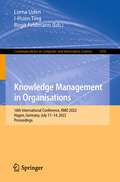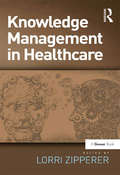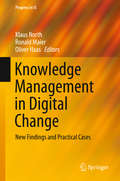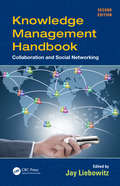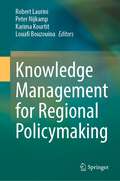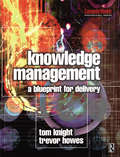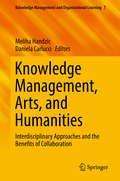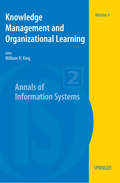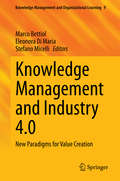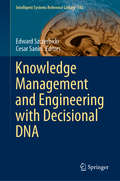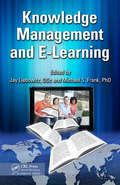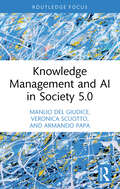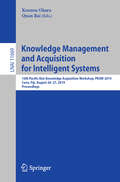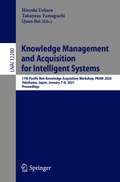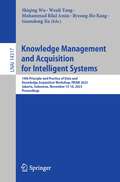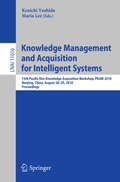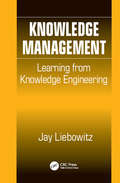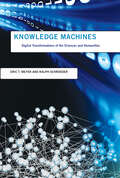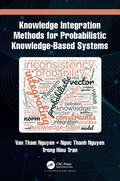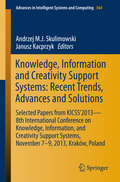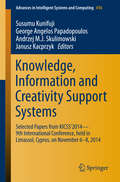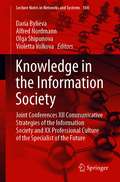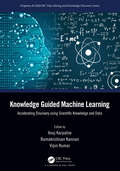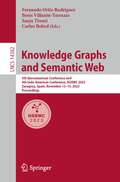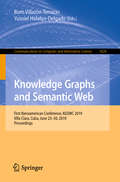- Table View
- List View
Knowledge Management in Organisations: 16th International Conference, KMO 2022, Hagen, Germany, July 11–14, 2022, Proceedings (Communications in Computer and Information Science #1593)
by Lorna Uden I-Hsien Ting Birgit FeldmannThis book contains the refereed proceedings of the 16th International Conference on Knowledge Management in Organizations, KMO 2022, held in Hagen, Germany, in July 2022. The 24 full papers and 5 short papers accepted for KMO 2022 were selected from 61 submissions and are organized in topical sections on: knowledge transfer and sharing; knowledge and organization; knowledge and service innovation; industry 4.0; information and knowledge systems; intelligent science; AI and new trends in KM.
Knowledge Management in Healthcare
by Lorri ZippererKnowledge management goes beyond data and information capture in computerized health records and ordering systems; it seeks to leverage the experiences of all who interact in healthcare to enhance care delivery, teamwork, and organizational learning. Knowledge management - if envisioned thoughtfully - takes a systemic approach to implementation that includes the embodiment of a learning culture. Knowledge is then used to support that culture and the knowledge workers within it to encourage them to share what they know, thusly enabling their peers, their organizations and ultimately their patients to benefit from their experience to proactively dismantle hierarchy and encourage sharing about what works, and what doesn’t to focus efforts on improvement. Knowledge Management in Healthcare draws on relevant business, clinical and health administration literature plus the analysis of discussions with a variety of clinical, administrative, leadership, patient and information experts. The result is a book that will inform thinking on knowledge access needs to mitigate potential failures, design lasting improvements and support the sharing of what is known to enable work towards attaining high reliability. It can be used as a general tool for leaders and individuals wishing to devise and implement a knowledge-sharing culture in their institution, design innovative activities supporting transparency and communication to strengthen existing programs intended to enhance knowledge sharing behaviours and contribute to high quality, safe care.
Knowledge Management in Digital Change: New Findings And Practical Cases (Progress in IS)
by Klaus North Ronald Maier Oliver HaasThis book features both cutting-edge contributions on managing knowledge in transformational contexts and a selection of real-world case studies. It analyzes how the disruptive power of digitization is becoming a major challenge for knowledge-based value creation worldwide, and subsequently examines the changes in how we manage information and knowledge, communicate, collaborate, learn and decide within and across organizations. The book highlights the opportunities provided by disruptive renewal, while also stressing the need for knowledge workers and organizations to transform governance, leadership and work organization. Emerging new business models and digitally enabled co-creation are presented as drivers that can help establish new ways of managing knowledge. In turn, a number of carefully selected and interpreted case studies provide a link to practice in organizations.
Knowledge Management Handbook: Collaboration and Social Networking, Second Edition
by Jay LiebowitzRecent research shows that collaboration and social networking foster knowledge sharing and innovation by sparking new connections, ideas, and practices. Yet these informal networks are often misunderstood and poorly managed. Building on the groundbreaking, bestselling first edition, Knowledge Management Handbook: Collaboration and Social Networkin
Knowledge Management for Regional Policymaking
by Robert Laurini Peter Nijkamp Karima Kourtit Louafi BouzouinaThe present publication focusses the attention on new avenues in regional information and knowledge management, while we will zoom in particularly on the potential promises and hurdles of digital technology. This digital challenge has already generated a wealth of implications in the area of smart or intelligent cities, but as yet far less has been achieved in the field of regional planning and regional science. There is clearly a need for a more systematic and wide-ranging assessment and presentation of emerging approaches and concepts in this field, for instance, in regard to principles (e.g. geographic rule modeling), methodologies (e.g. blockchain systems), data analytics (e.g. machine learning) and data governance (e.g. data sovereignty) of regional information and knowledge. Especially in our ‘big data’ era, a systematic, comprehensible and reliable acquisition, storage, sharing and handling of data (e.g. on the basis of systematic decomposition and filtering principles) is more needed than ever before. The present study seeks to present a selection of state-of-the-art contributions on advanced – often digitally-oriented – regional information and knowledge management foundations, principles and practices written by several experts in the field of spatial informatics. These contributions were collected with a view to the design of a comprehensive knowledge and research agenda, which was discussed during a brainstorm workshop in Lyon, France (October 2021). This book covers various fields of interest, such as GeoAI, knowledge modelling, IoT and scalability, space syntax, rule extraction, data governance and data self-sovereignty. It is concluded with a knowledge and research agenda outlining future endeavors in the field of the spatial information sciences (or spatial informatics).
Knowledge Management - A Blueprint for Delivery
by Tom Knight Trevor HowesWe are now in the 'third wave' of Knowledge Management - the first was focused on the potential of new technology, while the second focused on the nature of knowledge and how people 'know' and learn. The focus in the third phase is two-fold: building individual and team productivity, and proper alignment of Knowledge Management efforts in helping deliver on strategic goals of the organization.Knowledge Management- a Blueprint for Delivery explores and builds on current ideas about the dynamics of knowledge in organizations, answering such questions as: 'What is knowledge management?' and 'What does it mean for today's companies and organizations?' Written by two leading knowledge management practitioners, this book looks beyond academic theory and software company hype to focus on the roles that knowledge and information play in creating high-performance organizations. Built on their extensive experience of Knowledge Management programme design and delivery, Knowledge Management- a Blueprint for Delivery:contains a comprehensive survey of the whole area of Knowledge Management, from theory and strategy creation through to techniques, tools, and delivery of changeprovides an insight into developing and managing Knowledge Management initiativesbridges the gap between theoretical, strategic, and practical hands-on perspectives
Knowledge Management, Arts, and Humanities: Interdisciplinary Approaches and the Benefits of Collaboration (Knowledge Management and Organizational Learning #7)
by Meliha Handzic Daniela CarlucciThis book presents a series of studies that demonstrate the value of interactions between knowledge management with the arts and humanities. The carefully compiled chapters show, on the one hand, how traditional methods from the arts and humanities – e.g. theatrical improvisation, clay modelling, theory of aesthetics – can be used to enhance knowledge creation and evolution. On the other, the chapters discuss knowledge management models and practices such as virtual knowledge space (BA) design, social networking and knowledge sharing, data mining and knowledge discovery tools. The book also demonstrates how these practices can yield valuable benefits in terms of organizing and analyzing big arts and humanities data in a digital environment.
Knowledge Management and Organizational Learning
by William R. KingKnowledge management (KM) is a set of relatively-new organizational activities that are aimed at improving knowledge, knowledge-related practices, organizational behaviors and decisions and organizational performance. KM focuses on knowledge processes--knowledge creation, acquisition, refinement, storage, transfer, sharing and utilization. These processes support organizational processes involving innovation, individual learning, collective learning and collaborative decision-making. The "intermediate outcomes" of KM are improved organizational behaviors, decisions, products, services, processes and relationships that enable the organization to improve its overall performance. Knowledge Management and Organizational Learning presents some 20 papers organized into five sections covering basic concepts of knowledge management; knowledge management issues; knowledge management applications; measurement and evaluation of knowledge management and organizational learning; and organizational learning.
Knowledge Management and Industry 4.0: New Paradigms for Value Creation (Knowledge Management and Organizational Learning #9)
by Eleonora Di Maria Marco Bettiol Stefano MicelliThe book discusses the opportunities and challenges of managing knowledge in the new reality of Industry 4.0. Addressing paradigmatic changes in value creation due to the development of digital technologies applied to manufacturing (additive manufacturing, IoT, robotics, etc.), it includes theoretical and empirical contributions on how Industry 4.0 technologies allow firms to create and exploit knowledge. The carefully selected expert contributions highlight the potential of these technologies in acquiring knowledge from a larger number of sources and examine approaches to innovation, organization of activities, and stakeholder development in the context of this next industrial revolution.
Knowledge Management and Engineering with Decisional DNA (Intelligent Systems Reference Library #183)
by Edward Szczerbicki Cesar SaninThis is the first book on experience-based knowledge representation and knowledge management using the unique Decisional DNA (DDNA) technology. The DDNA concept is roughly a decade old, and is rapidly attracting increasing attention and interest among researchers and practitioners. This comprehensive book provides guidelines to help readers develop experience-based tools and approaches for smart engineering of knowledge, data and information. It does not attempt to offer ultimate answers, but instead presents ideas and a number of real-world case studies to explore and exemplify the complexities and challenges of modern knowledge engineering issues. It also increases readers’ awareness of the multifaceted interdisciplinary character of such issues to enable them to consider – in different ways – developing, evaluating, and supporting smart knowledge engineering systems that use DDNA technology based on experience.
Knowledge Management and E-Learning
by Jay Liebowitz Michael S. FrankThe rapidly growing demand for online courses and supporting technology has resulted in a plethora of structural and functional changes and challenges for universities and colleges. These changes have led many distance education providers to recognize the value of understanding the fundamental concepts of both e-learning and knowledge management (K
Knowledge Management and AI in Society 5.0 (Routledge Focus on Business and Management)
by Manlio Del Giudice Veronica Scuotto Armando PapaSociety 5.0 points toward a human-centred approach by the use of modern, advanced technologies and artificial intelligence. This book explores and offers an overview of knowledge management embraced in the current scenario of Society 5.0, shedding light on its importance in a society that is increasingly digital and interconnected. The book enhances current managerial and economic research by offering the “human” side of knowledge management (KM) intertwined with the use of artificial intelligences (AIs). Each chapter explores KM from different perspectives, including entrepreneurship, innovation, marketing, and strategy, in a theoretical and practical way. They include insights from both practitioners and scholars, enriched by practical tools that can be used during laboratories, workshops and tutorials. The book presents evidence on how to manage KM and develop new knowledge in different subjects, with the aim of overcoming conventional KM strategy and show how business and society are connected with “power of subjective human knowledge creation”. Offering both new insights, research and practical guidance, this book will appeal to academics and students of knowledge management as well as digital transformation practitioners looking for ways to transition their organizations from knowledge economy to digital economy.
Knowledge Management and Acquisition for Intelligent Systems: 16th Pacific Rim Knowledge Acquisition Workshop, PKAW 2019, Cuvu, Fiji, August 26–27, 2019, Proceedings (Lecture Notes in Computer Science #11669)
by Kouzou Ohara Quan BaiThis book constitutes the proceedings of the 16th International Workshop on Knowledge Management and Acquisition for Intelligent Systems, PKAW 2019, held in Cuvu, Fiji, in August 2019.The 9 full papers and 7 short papers included in this volume were carefully reviewed and selected from 38 initial submissions. The papers cover advanced research work that contributes to the technical and theoretical aspects in the fields of intelligent systems/agents, natural language processing, and applications of machine learning techniques including Deep Learning to real world problems.
Knowledge Management and Acquisition for Intelligent Systems: 17th Pacific Rim Knowledge Acquisition Workshop, PKAW 2020, Yokohama, Japan, January 7–8, 2021, Proceedings (Lecture Notes in Computer Science #12280)
by Hiroshi Uehara Takayasu Yamaguchi Quan BaiThis book constitutes the proceedings of the 17th International Workshop on Knowledge Management and Acquisition for Intelligent Systems, PKAW 2020, held in Yokohama, Japan, in January 2021. The 10 full papers and 5 short papers included in this volume were carefully reviewed and selected from 28 initial submissions. PKAW primarily focuses on the multidisciplinary approach of the human-driven and data-driven knowledge acquisition, which is the key concept that has remained unchanged since the workshop has been established.
Knowledge Management and Acquisition for Intelligent Systems: 19th Principle and Practice of Data and Knowledge Acquisition Workshop, PKAW 2023, Jakarta, Indonesia, November 15-16, 2023, Proceedings (Lecture Notes in Computer Science #14317)
by Shiqing Wu Wenli Yang Muhammad Bilal Amin Byeong-Ho Kang Guandong XuThis book constitutes the refereed proceedings of the 19th Principle and Practice of Data and Knowledge Acquisition Workshop, PKAW 2023, held in conjunction with the 20th Pacific Rim International Conference on Artificial Intelligence (PRICAI 2023), in November 2023, in Jakarta, Indonesia. The 9 full papers and 2 short papers included in this volume were carefully reviewed and selected from 28 initial submissions. They are organized in the topical section such as machine learning, natural language processing, and intelligent systems.
Knowledge Management and Acquisition for Intelligent Systems: 15th Pacific Rim Knowledge Acquisition Workshop, Pkaw 2018, Nanjing, China, August 27-28, 2018, Proceedings (Lecture Notes in Computer Science #11016)
by Kenichi Yoshida Maria LeeThis book constitutes the proceedings of the 15th International Workshop on Knowledge Management and Acquisition for Intelligent Systems, PKAW 2018, held in Nanjing, China, in August 2018. The 15 full papers and 7 short papers included in this volume were carefully reviewed and selected from 51 initial submissions. They cover the methods and tools as well as the applications related to developing a knowledge base, healthcare, financial systems, and intelligent systems.
Knowledge Management: Learning from Knowledge Engineering
by Jay LiebowitzKnowledge Management (KM) is strongly rooted in the discipline of Knowledge Engineering (KE), which in turn grew partly out of the artificial intelligence field. Despite their close relationship, however, many KM specialists have failed to fully recognize the synergy or acknowledge the power that KE methodologies, techniques, and tools hold for enh
Knowledge Machines: Digital Transformations of the Sciences and Humanities (Infrastructures)
by Eric T. Meyer Ralph SchroederAn examination of the ways that digital and networked technologies have fundamentally changed research practices in disciplines from astronomy to literary analysis.In Knowledge Machines, Eric Meyer and Ralph Schroeder argue that digital technologies have fundamentally changed research practices in the sciences, social sciences, and humanities. Meyer and Schroeder show that digital tools and data, used collectively and in distributed mode—which they term e-research—have transformed not just the consumption of knowledge but also the production of knowledge. Digital technologies for research are reshaping how knowledge advances in disciplines that range from physics to literary analysis. Meyer and Schroeder map the rise of digital research and offer case studies from many fields, including biomedicine, social science uses of the Web, astronomy, and large-scale textual analysis in the humanities. They consider such topics as the challenges of sharing research data and of big data approaches, disciplinary differences and new forms of interdisciplinary collaboration, the shifting boundaries between researchers and their publics, and the ways that digital tools promote openness in science.This book considers the transformations of research from a number of perspectives, drawing especially on the sociology of science and technology and social informatics. It shows that the use of digital tools and data is not just a technical issue; it affects research practices, collaboration models, publishing choices, and even the kinds of research and research questions scholars choose to pursue. Knowledge Machines examines the nature and implications of these transformations for scholarly research.
Knowledge Integration Methods for Probabilistic Knowledge-based Systems
by Van Tham Nguyen Ngoc Thanh Nguyen Trong Hieu TranKnowledge-based systems and solving knowledge integrating problems have seen a great surge of research activity in recent years. Knowledge Integration Methods provides a wide snapshot of building knowledge-based systems, inconsistency measures, methods for handling consistency, and methods for integrating knowledge bases. The book also provides the mathematical background to solving problems of restoring consistency and integrating probabilistic knowledge bases in the integrating process. The research results presented in the book can be applied in decision support systems, semantic web systems, multimedia information retrieval systems, medical imaging systems, cooperative information systems, and more. This text will be useful for computer science graduates and PhD students, in addition to researchers and readers working on knowledge management and ontology interpretation.
Knowledge, Information and Creativity Support Systems: Recent Trends, Advances and Solutions
by Andrzej M.J. Skulimowski Janusz KacprzykThis volume contains some carefully selected papers presented at the 8th International Conference on Knowledge, Information and Creativity Support Systems KICCS'2013, which was held in Kraków and Wieliczka, Poland in November 2013. In most cases the papers are extended versions with newer results added, representing virtually all topics covered by the conference. The KICCS'2013 focus theme, "Looking into the Future of Creativity and Decision Support Systems", clearly indicates that the growing complexity calls for some deeper and insightful discussions about the future but, obviously, complemented with an exposition of modern present developments that have proven their power and usefulness. Following this theme, the list of topics presented in this volume include some future-oriented fields of research, such as anticipatory networks and systems, foresight support systems, relevant newly-emerging applications, exemplified by autonomous creative systems. Special attention was also given to cognitive and collaborative aspects of creativity.
Knowledge, Information and Creativity Support Systems
by Susumu Kunifuji George Angelos Papadopoulos Andrzej M. J. Skulimowski Janusz KacprzykThisvolume consists of a number of selected papers thatwere presented at the 9th International Conference on Knowledge, Informationand Creativity Support Systems (KICSS 2014) in Limassol, Cyprus, after theywere substantially revised and extended. The 26 regularpapers and 19 short papers included in this proceedings cover all aspects ofknowledge management, knowledge engineering, intelligent information systems,and creativity in an information technology context, including computationalcreativity and its cognitive and collaborative aspects.
Knowledge in the Information Society: Joint Conferences XII Communicative Strategies of the Information Society and XX Professional Culture of the Specialist of the Future (Lecture Notes in Networks and Systems #184)
by Daria Bylieva Alfred Nordmann Olga Shipunova Violetta VolkovaThis book provides a snapshot of state-of-the-art interdisciplinary discussions in Russia about technology in the information society. New technologies are subject to original theoretical analysis, but there are also reflections on the practical experience of their application. The book covers a range of topics which includes human–technology interaction, education in digital reality, distance education due to COVID-19 quarantine measures, cognitive technologies, system analytics of information and communication technologies. The book collects contributions from philosophy, didactics, computer sciences, sociology, psychology, media studies, and law. It contains a selection of papers accepted for presentation at the XX International Conference «Professional Culture of the Specialist of the Future» (26–27 November 2020, St. Petersburg) and the XII International Conference «CommunicativeStrategies of the Information Society» (23–24 October 2020, St. Petersburg).
Knowledge Guided Machine Learning: Accelerating Discovery using Scientific Knowledge and Data (Chapman & Hall/CRC Data Mining and Knowledge Discovery Series)
by Anuj Karpatne Ramakrishnan Kannan Vipin KumarGiven their tremendous success in commercial applications, machine learning (ML) models are increasingly being considered as alternatives to science-based models in many disciplines. Yet, these "black-box" ML models have found limited success due to their inability to work well in the presence of limited training data and generalize to unseen scenarios. As a result, there is a growing interest in the scientific community on creating a new generation of methods that integrate scientific knowledge in ML frameworks. This emerging field, called scientific knowledge-guided ML (KGML), seeks a distinct departure from existing "data-only" or "scientific knowledge-only" methods to use knowledge and data at an equal footing. Indeed, KGML involves diverse scientific and ML communities, where researchers and practitioners from various backgrounds and application domains are continually adding richness to the problem formulations and research methods in this emerging field. Knowledge Guided Machine Learning: Accelerating Discovery using Scientific Knowledge and Data provides an introduction to this rapidly growing field by discussing some of the common themes of research in KGML using illustrative examples, case studies, and reviews from diverse application domains and research communities as book chapters by leading researchers. KEY FEATURES First-of-its-kind book in an emerging area of research that is gaining widespread attention in the scientific and data science fields Accessible to a broad audience in data science and scientific and engineering fields Provides a coherent organizational structure to the problem formulations and research methods in the emerging field of KGML using illustrative examples from diverse application domains Contains chapters by leading researchers, which illustrate the cutting-edge research trends, opportunities, and challenges in KGML research from multiple perspectives Enables cross-pollination of KGML problem formulations and research methods across disciplines Highlights critical gaps that require further investigation by the broader community of researchers and practitioners to realize the full potential of KGML
Knowledge Graphs and Semantic Web: 5th Iberoamerican Conference and 4th Indo-American Conference, KGSWC 2023, Zaragoza, Spain, November 13–15, 2023, Proceedings (Lecture Notes in Computer Science #14382)
by Fernando Ortiz-Rodriguez Boris Villazón-Terrazas Sanju Tiwari Carlos BobedThis book constitutes the refereed proceedings of the 5th Iberoamerican Conference and 4th Indo-American Conference on Knowledge Graphs and Semantic Web, KGSWC 2023, held jointly in Zaragoza, Spain, during November 13–15, 2023.The 18 full and 2 short papers presented were carefully reviewed and selected from 50 submissions. They focus on the following topics: knowledge representation; natural language processing/text mining; and machine/deep learning research.
Knowledge Graphs and Semantic Web: First Iberoamerican Conference, KGSWC 2019, Villa Clara, Cuba, June 23-30, 2019, Proceedings (Communications in Computer and Information Science #1029)
by Boris Villazón-Terrazas Yusniel Hidalgo-DelgadoThis book constitutes the thoroughly refereed proceedings of the First Iberoamerican Conference, KGSWC 2019, held in Villa Clara, Cuba, in June 2019. The 14 full papers and 1 short paper presented were carefully reviewed and selected from 33 submissions. The papers cover wide research fields including artificial intelligence; knowledge representation and reasoning; ontology engineering; natural language processing; description logics; information systems; query languages; world wide web; semantic web description languages; and information retrieval.
